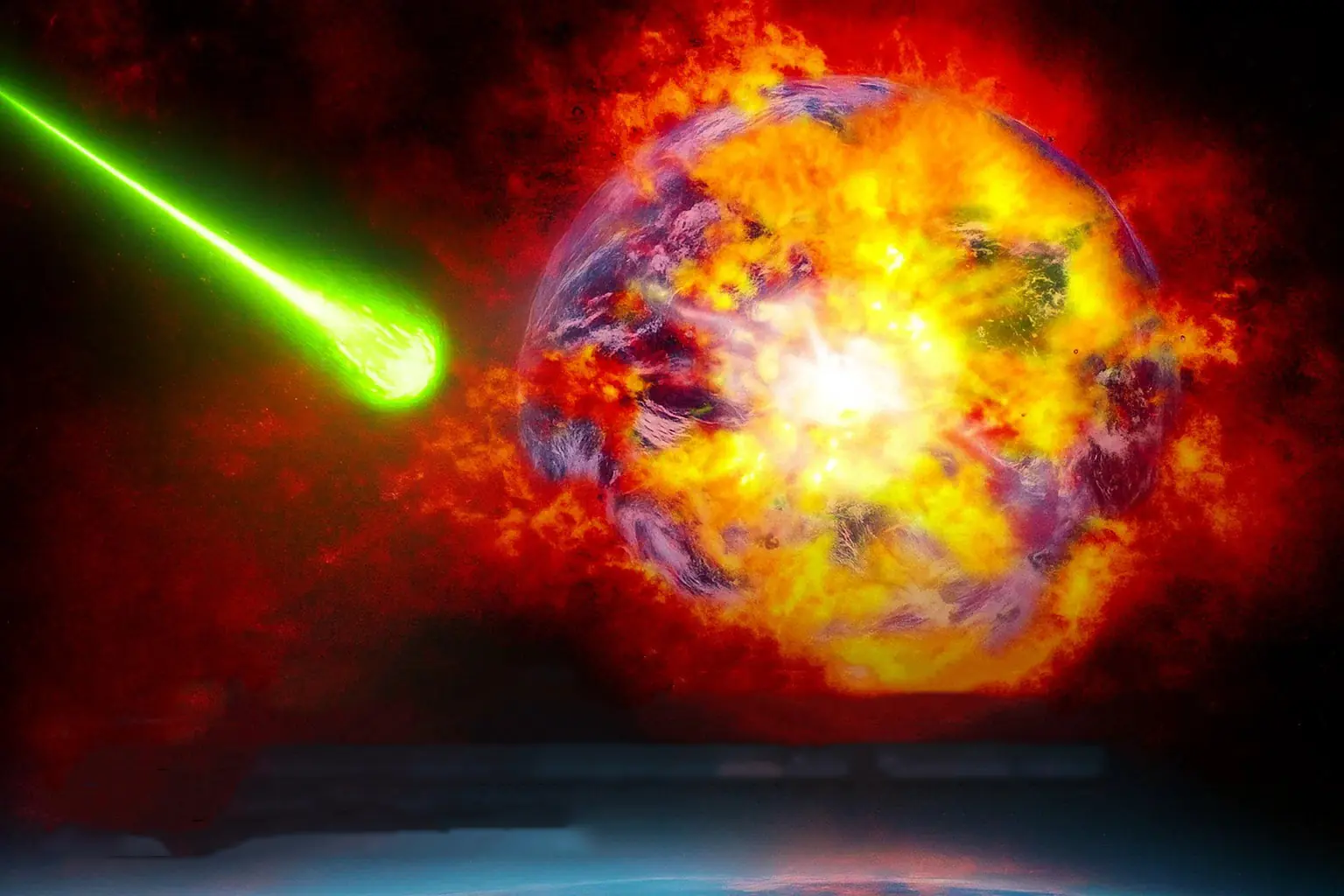
Experts Warn of Imminent 'Cosmic Hell' That Could Wipe Out Mankind, Exact Time Revealed
Discussions about the end of the world—especially on a cosmic scale—are seldom far from headline-grabbing speculation. While certainty is beyond our reach, a recent wave of astronomical studies offers some of the most detailed estimates yet. If you’re wondering whether humanity is facing an eventual cosmic collapse, here’s what leading researchers are saying about the so‑called Big Crunch.
At its core, the Big Crunch hypothesis suggests that the universe’s expansion may one day reverse, collapsing back into a dense singularity—something akin to the Big Bang in reverse. While it was long considered unthinkable after the discovery of dark energy accelerating cosmic expansion, evolving observations may be changing that view.

🌌 New Data: Dark Energy Appears to Fade
The Dark Energy Spectroscopic Instrument (DESI) and the Dark Energy Survey (DES) have collectively mapped over 15 million galaxies to reconstruct the universe’s expansion history over the past 11 billion years. Surprisingly, their data suggests dark energy might not be a constant—its influence appears to be gradually weakening.
If dark energy diminishes over time, its repulsive force may eventually give way to gravitational pull, causing cosmic expansion to halt—and then reverse. DESI researchers describe it as the universe acting like an elastic band: it stretches to a maximum size (projected to be ~69% larger than today), then snaps back into contraction.
Under the Microscope: Expert Predictions
Cosmologists from Cornell University and Shanghai Jiao Tong University have used these findings to propose a timeline:
- Collapse begins: in approximately 10–11 billion years
- Final singularity reached: around 33 billion years from now.
In other words, the universe’s current age (~13.8 billion years) falls roughly at mid‑lifecycle—what’s left is a slow reversal unfolding over another 20 billion years.
“It is just like throwing a basketball vertically upwards... The negative cosmological constant acts like Earth's gravity, which pulls the basketball downward,” explained Dr. Ethan Yu–Cheng. “The basketball will de‑accelerate until reaching the maximum height and start to fall.”
“Intelligent civilizations at solar‑system or even galactic scales would not notice any obvious phenomenon because these changes happen at much larger cosmological scales,” added Dr. Hoang Nhan Luu. These subtle shifts would be imperceptible across human timescales until very late in the process.
What Happens During the Collapse?
Cosmologists describe a dramatic reverse-evolution:
- Groups of galaxies merge as distances shrink
- Cosmic microwave background radiation heats up due to blueshift
- Stars collide and overheat; some evaporate before the final collapse
- At the very end, atoms break down, and all matter condenses into an infinitely dense singularity—what some call a “cosmic fireball”
In the final moments, temperature throughout the cosmological expanse could rival that of a star’s surface—rendering any surviving structures uninhabitable.
Can Humans Prepare? A Far‑Future Plan
If humanity endures for billions more years, could we adapt to such a cosmic fate?
Dr. Henry Tye suggests: “To survive, human beings have to move to the edge of our solar system or beyond. We have a few billion years’ time to prepare for that trip.”
Practically speaking, no perceptible warning—beyond long-term cosmological data—would appear until the acceleration reverse nears its final phase. By then, expansions and contractions would occur over scales far exceeding human lifespans: civilizations like us would only perceive the end during the final collapse itself.
How Does This Compare to Other End‑Universe Scenarios?
There are three major theories regarding the universe’s ultimate fate:
- Big Freeze (Heat Death): perpetual expansion, galaxies drift apart, star formation ceases, entropy peaks ⎯ likely outcome under constant dark energy.
- Big Rip: dark energy grows stronger, eventually tearing galaxies, stars, planets—and atoms—apart, ending with zero-size universe ⎯ speculative, possibly billions of years ahead.
- Big Crunch: expansion ends and reverses under weakening dark energy, eventually collapsing everything into a singularity—what experts are reconsidering now.
Some versions of Big Crunch models even suggest that post-collapse, a new Big Bang might launch a fresh cosmic cycle—the Big Bounce concept.
What’s at Stake—Over 20 Billion Years From Now
Here’s a high‑level summary:
|
Timeline Phase |
Estimated Time from Today |
Event Description |
|
Start of collapse |
~10–11 billion years |
Expansion slows, then reverses ❤️ |
|
Final singularity |
~33 billion years |
Universe fully collapses |
|
Comparison point |
~13.8 billion years (today) |
Mid‑cosmic lifespan |
|
Majority of collapse duration |
~8.5 billion years |
Period of accelerated contraction |
Despite the bleakness, this event is so far off that stars will stop shining, galaxies collide, Earth’s Sun will have died, and life as we know it will cease long before cosmic collapse arrives.
Does This Mean the End Is Certain?
Not necessarily. All existing projections depend on our understanding of dark energy and its future behavior:
- Observational bounds suggest doomsday (collapse) doesn’t begin earlier than ~24–42 billion years out at 68–95% confidence.
- Other long‑range projections place star formation and structural evolution over trillions of years—and favor Heat Death or proton decay scenarios.
- Some models predict “nothing happens”—entropy freezes the universe into lifeless, dark minimalism rather than collapse or expansion.
In short: while a Big Crunch is gaining traction thanks to DESI and DES insights, alternate fates remain plausible. Only more precise and long-term observations will tilt the balance.
Why You Should Care—Even Now
Though the ending is billions of years away, the emerging evidence is shifting scientific consensus on cosmic fate. Understanding dark energy—the force shaping expansion—is one of the greatest unsolved mysteries in physics.
Grasping it better could:
- Help researchers design deeper astronomical studies
- Inspire generations to ponder humanity’s long‑term prospects
- Ignite scientific creativity around survival strategies for far‑future civilizations
Ultimately, this cosmic countdown is more than headlines—it reflects how far human curiosity and cosmology have journeyed.
News in the same category


Unbelievable: China is About to Launch the First ‘Pregnancy Robot’ to Carry a Baby

This Is How These 10 Worldwide Famous Kids Look Like Now

What Does It Mean To Wear a Ring On The Right Hand

Hotel Workers Reveal What Goes On

Scientists Explain Why ‘Doing Your Own Research’ Leads to Believing Conspiracies

The Richest Americans Still Die Earlier Than the Poorest Europeans

Ring Finger Longer Than An Index Finger

She Spent $70,000 on Cosmetic Procedures — Now She’s Owning Her Beauty Despite the Backlash

Woman employed by popular mobile network sues company after being 'forced' to do nothing for 20 years

This School Is Teaching Teen Girls Important Life Skills Like Changing Tires and Other Car Maintenance

Indiana Woman Arrested After Traveling To DC To Kidnap And Assassinate Trump

Why Slugs Deserve More Credit Than You Think

Sink Trick You Should Always Do Before Vacation

The Meaning of Having an Unmade Bed

How to Charge Your Phone to Extend Battery Life

People Are Just Realizing Why Women’s Underwear Have A Bow On Front

Brown vs. White Eggs: Which Should You Choose?

The Secret Behind the Pocket in Panties: What It Really Does for Your Comfort
It’s not a secret storage space but a carefully designed gusset that enhances hygiene, improves comfort, and makes your underwear last longer.
News Post

Doctors uncover knife unknowingly lodged in man's chest for 8 years in insane discovery

Elon Musk unveils new AI project that could recreate Microsoft’s entire business operations

Arkansas woman accidentally discovers $27,000 dollars after kicking 'spiderweb' in park

Exactly how virus carried by 'Frankenstein' rabbits growing black 'tentacles' spreads following urgent warning from experts

The Elders' Teachings Are Not Wrong: "The Kitchen Should Not Face Three Directions, and the Bed Should Not Be Placed in Three Locations"

5 Types of Plants That Snakes Love: If You Plant Them in Front of Your House, Remove Them Immediately Before It’s Too Late

If Your Non-Stick Pan Has Lost Its Coating, Don’t Rush to Throw It Away. Follow This Trick to Turn Your Old Pan Into a Like-New One.

Cooking Oil Often Splashes When Frying? Add This Ingredient to the Pan, and You Won't Have to Worry About Oil Splattering or Sticking to the Pan

Is It Correct to Close the Door When Using the Air Conditioner? Here Are 5 Mistakes That Can Cause Your Electricity Meter to Increase 2-3 Times

Boiling Eggs with Just Water is Not Enough: Add This Ingredient, and the Eggs Will Cook Evenly, Have a Rich Flavor, and the Shells Will Peel Off Easily

Do Not Ignore These 10 Warning Signs That Your Kidneys May Be In Danger

Buying Meat and Just Placing It Directly in the Freezer for Storage is a Mistake: The Shop Owner Shares a Trick to Keep Meat 'Fresh for a Whole Year' Without Spoiling

Sprinkle a Little of This Powder into the Oil Before Frying, Everyone Will Be Amazed by Its Incredible Effectiveness

If Your Body Suddenly Jerks While Falling Asleep, This Is What It Means

What Is This Button In The Car For

How Long Cooked Food Can Stay In The Refrigerator

If You Eat Eggs Every Day

Vegetables To Clean Your Arteries And Prevent Heart Attack

Pain in This Part of the Body Could Indicate Cancer Cells are 'Awakening' – Both Men and Women Shouldn't Ignore It
